
There’s a particular kind of foreign policy scholar who takes after the Kissinger brand of world systems and Great Man theory. In conversation, they will use their hands (having since high school taken to wearing large watches, the sleeves of a pastel button-down rolled up) to paint their global vision in broad brushstrokes. Everything is historical analogy and moral orders. He coins new names for the civilizational trends he “discovers” and the doctrines he “invents”.
With Henry Kissinger, architect of America’s Cold War policy under Ford and Nixon, turned 93 this year, you have to wonder if any of that philosophizing is useful any more. Literature on Kissinger’s thought often cites his 377-page senior thesis at Harvard, “The Meaning of History: Reflections on Spengler, Toynbee, and Kant,” a text so long it inspired Harvard to institute a max on thesis length. In it he pushes a philosophy of history not as a mere collection of facts and patterns, but an account of man’s internal experiences within the world of facts, a story of culture-specific souls (the Russian psyche, the West’s will to power) in conflict; a history that can “grasp of the totality of life, instead of just its appearances.”
The philosopher Oswald Spengler’s writing is a good example of this wide poetic lens. His Decline of the West treats civilizations like organisms, with a natural lifespan and a set of foundational ideas and ethics (a geist) moving it forward until the culture inevitably turns on its principles and extinguishes(1). “Each Culture has its own new possibilities of self-expression which arise, ripen, decay,” Spengler writes, “each limited in duration and self-contained, just as each species of plant has its peculiar blossom.” Kissinger echoes Spengler when he talks about the need to respect a country’s “national idea” or purpose, the relativism of a people’s ethics. In his latest book, World Order, Kissinger offers a Spengler-spangled product, exploring large concepts like European Order, American Foreign Policy, or the Arabic World in terms of their cultural roots and “underlying spirit”(2).
He also feels deeply Spengler’s sense of decay. Even the great statesmen Kissinger often praises—Bismarck, Metternich—who warped and rescued the international order with German unification and the Congress of Vienna respectively, can only postpone the decline of their countries (from Kissinger’s undergraduate thesis: “Life is suffering…Birth involves death…No civilization has yet been permanent, no longing completely fulfilled.”). The same goes for the United States. No “making great again” will bring back the Cold War superpower capable of pushing American values onto countries with no precedent or means to adopt them. In the post-Iraq century, the US has to work multilaterally, and curb its war-happy idealism with the “unsentimental analysis of underlying factors.”

This picture of countries as unfulfilled ideas, the need for unsentimental analysis and respect for historical memory all inform Kissinger’s opinion of the crisis in Ukraine, where even this month Russian and NATO forces have gathered in bulk on their respective borders. In a 2014 interview with Spiegel, Kissinger argued that the West underestimated how important Ukraine was to the Russian idea when the EU began negotiating a new economic relationship with Kiev. Yes, “the West could not accept the annexation; some countermeasures were necessary. But…Nobody is willing to fight over eastern Ukraine. That’s a fact of life.” By invading a sovereign country, Putin disrespected the world order, and the realist Kissinger wants to punish him. At the same time, the West’s attempts to absorb Ukraine was an attack on the Russian conception of itself, and Kissinger the philosopher wants to understand and move on.
In 1997 right wing intellectual Alexander Dugin published The Foundation of Geopolitics, a bible for the modern Russian hardliner. In it, Dugin outlines what he considers the Russian purpose: to resist the “Atlanticism” of the US and NATO, bent on containing Russia within rings of independent states. To ally with partners like Iran against the common enemy of western liberalism, preserve Russia’s value system and create a Eurasian empire by annexing Georgia and Ukraine…as well as Finland, Serbia, Romania, Bulgaria and Greece. This is an extreme, but the diluted version is close to Kissinger’s conception of Russia’s historical experience, aggressively territorial after the shock of Soviet collapse. In contrast, the US strives for a rule-based international order. Disobey a rule, receive sanctions. But as Kissinger writes in The National Interest, “To a country across which foreign armies have marched for centuries from both East and West, security will always need to have a geopolitical, as well as a legal, foundation…Russia’s perception of world order will [always]contain an inevitable strategic component.”
To respect Russia’s geopolitical paranoia, post-Soviet states like Ukraine seeking to distance themselves from Russia can’t just suddenly join the West, but must be organized to serve “as a bridge between Russia and the West, rather than as an outpost of either side.”
Understandable if the West wants Russia to be really comfortable with their eroded sphere of influence, but does Ukraine have a say? What if Ukraine doesn’t want to be a bridge? In probably one of the most Kissingerian exchanges of his career, Kissinger makes it clear to Spiegel what he thinks of the will of the Euromaidan revolution:
Kissinger: We have to remember that Russia is an important part of the international system, and therefore useful in solving all sorts of other crises… it is important that Ukraine remain an independent state…But I don’t think it’s a law of nature that every state must have the right to be an ally in the framework of NATO…
SPIEGEL: But we cannot tell the Ukrainians that they are not free to decide their own future.
Kissinger: Why not?
And that’s a disadvantage of the broad historian scholar. You’re flying too high to see the details, you lose touch. Historical memory is vague, and national ideals are often marketing more than policy. Governments are made of people, and their vision isn’t cohesive. Your thinking gets stuffy, and you have articles written about you like, “Does Henry Kissinger have a Conscience?”
What does “a bridge between East and West” even mean for Ukraine in practice? About half the country is in favor of integration with the EU, but as Poroshenko’s government loses its appeal, Euroskeptics from the east are gaining ground. The pro-Russian Opposition bloc already has a higher approval rating than either of the parties in the ruling coalition. The number of Ukrainians who dislike both the EU and Russia rose from 14 to 23 percent in the last year.
On August 10th, Ukrainian saboteurs were discovered planning to attack tourist centers in Crimea, which has only fed Russia’s argument that Ukraine is the one barring peace by failing to uphold the Minsk II Agreement and ceasefire. “Ukraine has been independent for only 23 years… its leaders have not learned the art of compromise, even less of historical perspective” wrote Kissinger in The Washington Post. But how do you convince a fragile state finding its freedom to give up swaths of its own territory for the sake of a historical Russian idea it doesn’t care about? How do you enforce a ceasefire with disorganized separatists in the Donbas who answer to no one? How do you sustain an international legal order while also humoring a country that deals in paranoia and anachronisms like Empire-building and buffer zones? Kissinger’s World Order doesn’t offer specifics.
It’s not that a Kissingerian personality is irrelevant in the post-Cold War era. We should still have big thoughts about how a culture’s history informs their worldview, about state decay, the relativism of ethics in foreign policy, the balance of practicality and idealism when working with states like Russia against chaos in Syria or for détente with Iran.
But the world has changed; Russians hacked the Democratic National Convention. Non-state actors matter in ways they didn’t used to, disrupting the logic of “national narratives.” Kissinger even notes, “Until quite recently, global international threats were identified with the accumulation of power by a dominating state. Today threats more frequently arise from the disintegration of state power and the growing number of ungoverned territories.” Younger scholars should be at least a little skeptical of their Cold War predecessors, and not try to emulate their vague philosophies of world order. Ukraine isn’t fated to be a Russian satellite state, there’s no “Russian idea” to empathize with. No historical analogy will help us deal with today’s facts on the ground, natural gas, corruption, cyber, separatism. In the age of physical and digital tribalism, Brexit, ISIS and drones, is a term like “world order” even useful for anything more than a good book title?
- Spengler, Oswald, “The Decline of the West,” Oxford University Press,
- Kissinger, Henry, “World Order,” Penguin Press,
The views expressed by the author do not necessarily reflect those of the Glimpse from the Globe staff, editors or governors.







